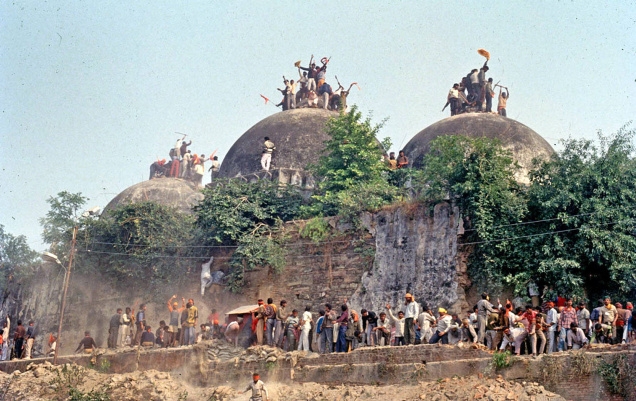December 6 Today

“Ek aur dhaka do” and as the domes of the Babri mosque fell one by one, India’s secularism shook under the impact. Thousands poured out on to the streets, across the country, in bewildered protest, still not sure how things had come to such a pass where the state had stood aside to watch mobs attack and fell a mosque in the name of religion. The political parties went silent, and except for the protests on the roads there was little to suggest at that time an organised resistance to the attack on the Indian Constitution that had taken place.
Today 24 years later, the challenge has re-emerged. More lethal, more vicious and more organised than before. The Muzaffarnagar riots, programs like ghar wapsi, love jihad that have taken numerous lives, the beef controversy that has seen people being dragged out of their homes and lynched, flogged, beaten stare India in the face. The Opposition, some who were in positions of power in 1992, has proved unequal to the task of defending India’s Constitution from concerted attack with the Congress still to find its feet on this issue---Karnataka being an exampe of continuing fliration with communalism---and some of the regional parties preferring to remain in ostrich mode, in the hope that what they do not acknowledge will pass.
December 6, 1992 was followed by secular protests demanding that the mosque be rebuilt. This was necessary to restore faith in justice, and to make it very clear that law would not just take its own course but would intervene to ensure that it prevailed. However, given the indifference of the Congress that had helped ensure a makeshift temple on the ground, the belligerence of the BJP, and the silence of most other political parties the demand was slowly given up, to be replaced by just a protest against communalism every broken anniversary of the event.
No one was taken to task, no one was prosecuted. Instead those who had brought down the mosque gloated over what was projected as a major achievement. In 24 years these forces of intolerance and communalism have grown to a point where those engineering riots are garlanded openly, anti-minority sentiments are expressed by major leaders without even a thought, and justice has come to represent the right of the mob over the individual. For instance, in Dadri the family of the man who was taken out of his home on rumours of eating beef, and beaten brutally to death is being hounded by the assailants who want them to be arrested and tried for keeping beef in their home!
The clock of intolerance has moved forward dramatically with the challenges facing the country immense. December 6 can serve as a reminder of the mistakes made in the run up to the demolition of the mosque, most so by the Congress that tried to accomodate the communal forces by supporting the campaign unleashed by these at the time, so that these are not repeated. Unfortunately given the record over the past years by those in the Opposition today, it seems that the lessons have not yet been learnt even though finally, over two decades later, the realisation of the dangers inherent in the situation has finally sunk in. Whether this will move into resistance, without political comprises, remains to be seen.



